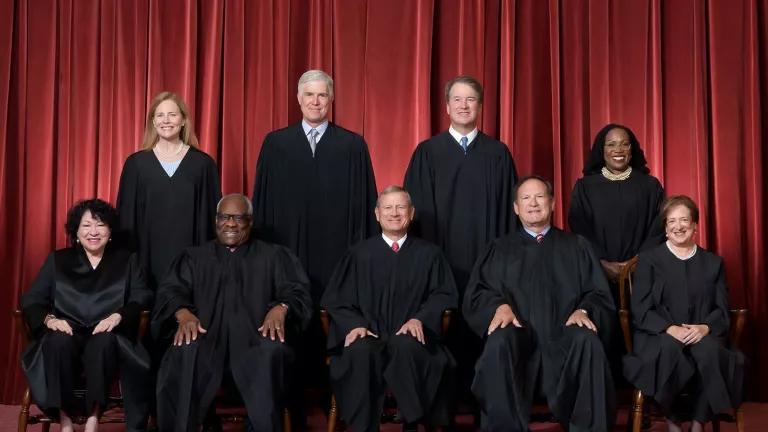Did Pebble Mine Shareholders “Blink” in Securities Fraud Suit?
Pebble Mine owner agrees to settle shareholder claims that company failed to disclose secret plan for exponential expansion of widely opposed Bristol Bay mine.

Serpentine Stream Upper Bristol Bay Watershed
Robert Glenn Ketchum
In a proposed settlement filed in federal court in Brooklyn last week, the embattled owner of the destructive Pebble Mine Northern Dynasty Minerals, former Pebble Partnership CEO Tom Collier, and Northern Dynasty Minerals CEO Ronald Thiessen (“defendants” or “Pebble”) have agreed to pay $6.375 million to shareholders alleging that the company and its leadership misled them, in violation of federal securities laws. Because court review is required, the settlement won’t become final until (1) a settlement hearing is held in the coming months and (2) court approval is obtained.
Given the amount of the settlement, its proposed allocation, and the large number of potential claimants, the agreement’s significance is unlikely to be about securing adequate compensation for the “hundreds, if not thousands” of “potential Settlement Class Members” allegedly misled by Pebble. More significant is the simple fact that Pebble, although denying any liability, has nevertheless agreed to pay millions of dollars to avoid trial of its shareholders’ seemingly credible, well documented allegations.
Based on the memorandum filed last week with the court by shareholders’ counsel, here are some details of what’s been proposed and what happens next:
- The total potential exposure to defendants posed by the litigation if it proceeds to trial is approximately $281 million. The proposed $6.375 million settlement amount, therefore, is 2.3 percent of Pebble’s financial risk.
- One-third of that settlement amount—or $2,125,000 (plus interest)—is proposed to go to plaintiffs’ lawyers in attorney’s fees, with additional sums to be drawn from the settlement amount up to $500,000 to reimburse counsel’s costs and $25,000 in total to be paid to the two named plaintiffs.
- Further sums will also be subtracted from the settlement amount for taxes, tax expenses (including, for example, expenses of tax attorneys and/or accountants), and $700,000 in “Administrative Costs” (up to $500,000 plus an additional $200,000 for “any necessary additional Administrative Costs” after the effective date of the Settlement).
- What then remains of the settlement amount will be shared among the “hundreds, if not thousands” of Northern Dynasty shareholders as compensation for the injury caused by the securities fraud that they have alleged.
Before this proposed settlement can be finalized, it must be presented to the court for review in a yet to be scheduled hearing to determine whether the agreement is “fair, reasonable, and adequate.” That hearing is proposed by shareholders’ counsel to be held at least 100 calendar days after the court enters a Preliminary Approval Order of the proposed settlement.
1. Allegations of Fact
At the heart of the shareholders’ allegations lies a fundamental disconnect between defendants’ public plans and its private plans for the size and duration of the Pebble Mine. The company filed and was pursuing a permit application with the Army Corps of Engineers for a 20-year, ten percent mine—a formal administrative proceeding requiring an environmental review of the smaller, proposed mine. Testifying under oath, Pebble’s CEO Tom Collier affirmed at a congressional hearing in October 2019 that “Pebble has no current plans, in this application or any other way, for expansion.” According to plaintiffs, this confirmed a January 2018 statement filed with the Securities and Exchange Commission in which the company committed to closure of the mine after its 20-year lifespan.
In September 2020, however, the Washington, D.C.-based non-profit Environmental Investigations Agency (“EIA”) released undercover videotapes (“Pebble Tapes”) of extensive conversations between Collier and Thiessen with potential investors—in fact, EIA investigators—in which the Pebble CEOs indicated a major, publicly undisclosed change in direction inconsistent with the publicly proposed smaller plan for the Pebble project. Repeatedly in the conversations the CEOs confirmed that the company’s actual plan for the mine, once permitted, was for development of the full ore body over a period of 180 to 200 years or more and that, although the pending permit application was exponentially smaller, “[expansion] is the plan,” “the likelihood [of expansion] is pretty much 100 percent almost,” and “key elements of the expansion are already contained in the current project . . . .”
At the same time, they cautioned the would-be investors that “it’s important to not make [the plan] public.”
As expected, the public reaction to the Pebble Tapes was hostile, and the project’s prospects quickly hit the rocks, both politically and administratively. Collier resigned two days after the tapes’ release, Alaska Senators Lisa Murkowski and Dan Sullivan announced their opposition to the project, the Army Corps denied the federal mining permit, and the company’s share price suffered the consequences.
The fundamental disconnect in project scale and duration could scarcely be more clearly documented—a disconnect between Pebble’s project presented for permitting and environmental review, on the one hand, and, on the other, its private plan for exponential expansion of that project, discussed explicitly by Pebble’s own CEOs and recorded on videotape—with dramatic negative consequences both for the project and for the share value of Northern Dynasty’s stock. Within just weeks of the Army Corps’ permit denial, Northern Dynasty shareholders filed two class action lawsuits against the company, Collier, and Thiessen. Following consolidation of the cases, and instead of answering the allegations in the complaint, defendants filed a motion to dismiss the litigation.
On December 18, 2022, based on the allegations of fact cited above and discussed at length in the court’s opinion, that motion was denied.
2. Denial of Motion to Dismiss
As compelling as the Pebble Tapes are in establishing the underlying fact of Northern Dynasty’s plans, the merit of the shareholders’ case is further strengthened by the legal analysis of Senior District Court Judge Eric Vitaliano—appointed by President George W. Bush in 2005—in his opinion denying Pebble’s motion to dismiss. Citing the four-part test for securities fraud, the court noted that “the plaintiffs are off to a fast start in satisfying their burden,” with Collier’s testimony meeting the first three criteria and the Pebble Tapes satisfying the fourth:
“Collier testified in October 2019 that “Pebble has no current plans, in this application or in any other way, for expansion,” Am. Compl. ¶ 100 (emphasis added), and Northern Dynasty’s January 2018 6-K described the Project as “designed for closure” following its 20-year lifespan, 6 id. ¶ 72. But the Pebble Tapes, interpreted in the light most favorable to plaintiffs, revealed a definite (and secret) plan to extend the Project. . . . Defendants therefore had a duty to publicly disclose this expanded plan that was “under active and serious consideration.” But between the time of Collier’s testimony and the release of the tapes, defendants did not do so. Plaintiffs have plausibly pleaded that defendants did not satisfy their duty.”
Judge Vitaliano explained:
“Collier’s testimony and defendants’ filings with the SEC induced investors to believe that the Project would not be expanded beyond the scope specified in the 2017 permit application. Collier’s testimony that defendants had no plans for expansion was a promise to continue this plan. And the Pebble Tapes reveal a change in direction, with both Collier and Thiessen indicating the real plan was for expansion.”
To Pebble’s contention that the market already knew of the “possibility of expansion,” the court was unpersuaded, finding a further affirmative duty to disclose given that (1) “silence about expansion of the Project could reasonably lead investors to believe that Northern Dynasty still planned, as they stated in their congressional testimony, not to expand the Project . . .” and (2) “the possibility of expansion” is not the same as the “definite plan of expansion thereafter . . . .”
Judge Vitaliano was satisfied that the plaintiffs had sufficiently alleged Pebble’s “definitive” plans for expansion, the significance of that information to investors, and the likelihood that disclosure of such information could have had an adverse effect on the prospects for permitting:
“Plaintiffs sufficiently allege that defendants definitively planned to expand the Project, and disclosure of this plan would have significantly altered the total mix of information made available to investors. Because Collier’s Congressional testimony was an effort to increase the likelihood of permit approval, a reasonable investor would consider facts cutting against his testimony, and therefore equivalently against permit approval, significant. Plaintiffs have, certainly, plausibly tendered such a pleading.”
The court also rejected Pebble’s challenge to allegations of motive:
“Plaintiffs adequately plead that defendants had a motive to hide their expansion plans, specifically, that they were motivated to do so in order to get the Project approved. See Opp’n Mem. at 49. By mixing in motive with opportunity, the cocktail is complete; the desire to get the Project approved provides the mix.”
The fact that Pebble CEO Collier had a contractual expectation of a bonus of $12.5 million on successful permitting by the Army Corps provided additional evidence of motive, in Judge Vitaliano’s view, to “commit fraud by misrepresenting the size of the Project in order to obtain the permit for the Project, and correspondingly, to obtain a bonus for himself.”
Finally, on the issue of intent, the court found strong circumstantial evidence of “conscious misbehavior” in defendants’ discussion of the plan for expansion “while also discussing the importance of keeping this information nonpublic.”
3. Significance of Proposed Settlement
Why does this settlement matter?
First, despite a long history of failure, Northern Dynasty hasn’t given up. The Pebble Mine has been widely condemned—locally in Bristol Bay, state-wide in Alaska, and nationally. Even Pebble’s major mining company partners and investors have walked away. In the fall of 2020, it was denied a permit by the Army Corps of Engineers, and in January 2023 it was vetoed by the Environmental Protection Agency. Since 2011 Northern Dynasty’s share price has dropped from over $21.00 a share to $0.22 a share today.
But the Pebble Mine is Northern Dynasty’s only asset and its reason to exist. It has pursued the project despite insurmountable legal, political, and financial obstacles, and this settlement will enable it to continue as a going concern. That reality may be a significant motivator for both Pebble and its disappointed shareholders in reaching an agreement.
Second, the shareholders’ claims not only allege fraud against them personally but implicitly depict what amounts to a fraud on the entire public permitting process – that is, its integrity, transparency, and regulatory impact. While pursuing a permit based on an environmental review of a 20-year mine plan for just one-tenth of the total ore body, the company privately planned an exponential expansion that would generate less public resistance and inevitably receive narrower regulatory oversight than if that expansion were disclosed to the public from the outset.
The fact that Pebble has now agreed to pay millions to settle its shareholders’ claims is indicative not just of a concern for financial exposure but of their disdain and disregard for the public welfare. As expressed by the Bristol Bay Defense Fund, “Northern Dynasty acted without any regard for the Tribes, commercial and sport fishers, or members of the Bristol Bay community who would be the most gravely impacted by their reckless and devious mining proposal.”
It has always been sensible to be skeptical of Pebble and its public assurances, and the Pebble Tapes made that caveat indisputable. While court approval of the proposed settlement isn’t a certainty until it’s granted, Pebble’s decision to settle rather than defend against the serious claims lodged by its own shareholders speaks volumes—no matter the outcome of the court’s review.




